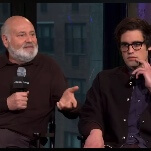Big Fat Liar

Since the release of Home Alone, which ranks with Pulp Fiction and Halloween in terms of the amount of derivative crap it inspired, kiddie filmmakers have sought out increasingly desperate variations on the theme of white-bread children cheerfully torturing adults. Co-written and produced by ex-Head Of The Class cast member and Good Burger director Brian Robbins, Big Fat Liar trots out John Hughes' trusty template one more time, wedding it to a limp Hollywood spoof seemingly intended for those who couldn't stomach the slashing satire of America's Sweethearts. Cast in his first lead role since Malcolm In The Middle made him a household name, Frankie Muniz stars as an irascible 14-year-old with a propensity for stretching the truth. Caught lying about an important school paper, Muniz is given several hours to write it, but as he attempts to turn it in, he's struck by the car of an overbearing movie producer (Paul Giamatti) who subsequently steals the paper and uses it as the basis for a much-hyped film. Muniz, meanwhile, is forced to go to summer school, but upon learning of Giamatti's deception, he road-trips to Hollywood to humiliate, browbeat, and torture Giamatti into admitting that he stole Muniz's idea. Alternately dull and abrasive, Big Fat Liar's screenplay, co-written by Robbins and fellow Head Of The Class alumnus Dan Schneider, is a model of comic inefficiency. Like a Rube Goldberg contraption, it goes to excruciating, wildly implausible lengths for the flimsiest of payoffs. Muniz and Giamatti have done terrific work elsewhere, but they're stymied by Big Fat Liar's script; Giamatti in particular works up industrial doses of flop-sweat trying to breathe new life into a hackneyed stereotype. Big Fat Liar periodically attempts to muster a sense of awe and wonder at Hollywood's capacity for manufacturing illusions, most notably during a climax that rips off the transcendent back-lot chase from Pee-wee's Big Adventure. But any children unfortunate enough to be subjected to a steady diet of product this shrill and insulting are likely to permanently turn their backs on the possibilities of film.























![HBO teases new Euphoria, Larry David, and much more in 2026 sizzle reel [Updated]](https://img.pastemagazine.com/wp-content/avuploads/2025/12/12100344/MixCollage-12-Dec-2025-09-56-AM-9137.jpg)
















